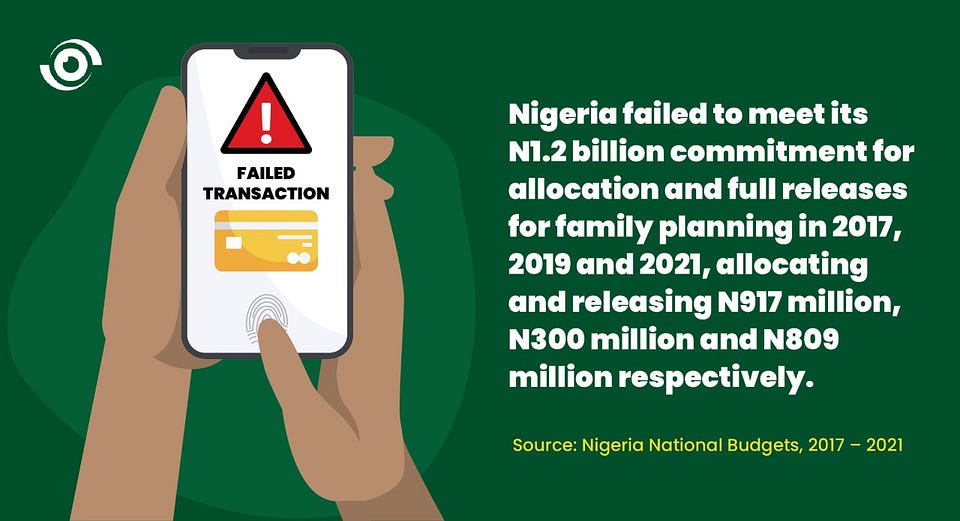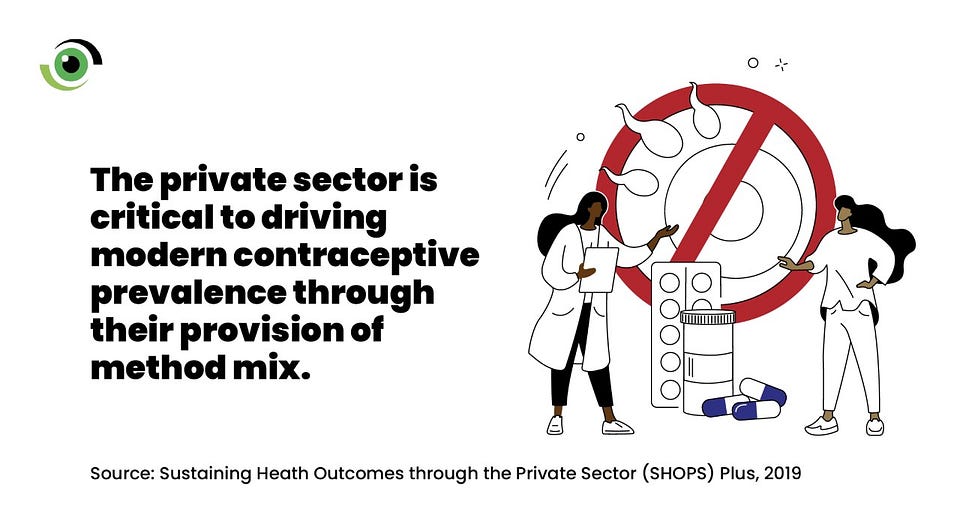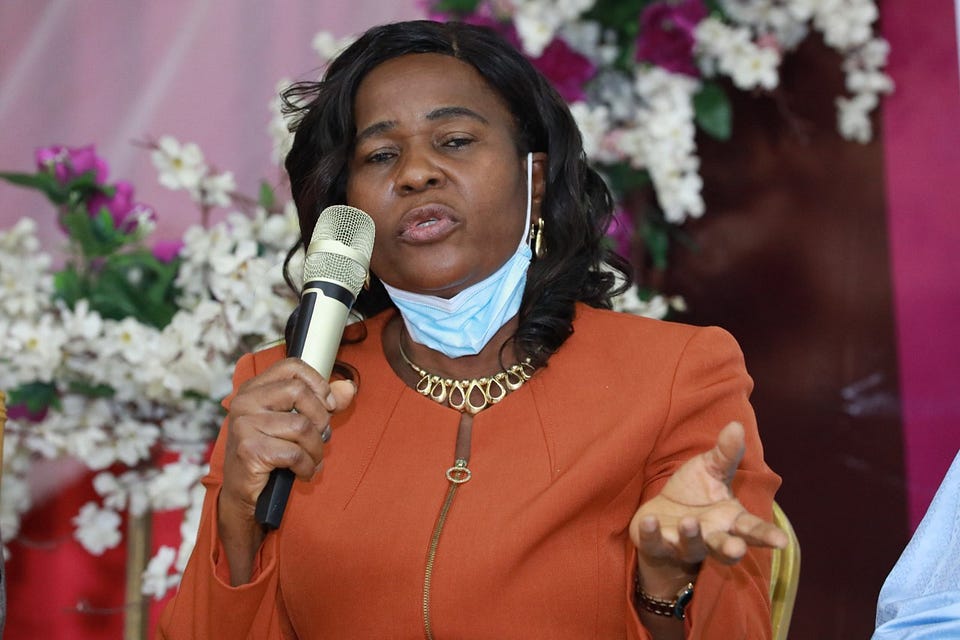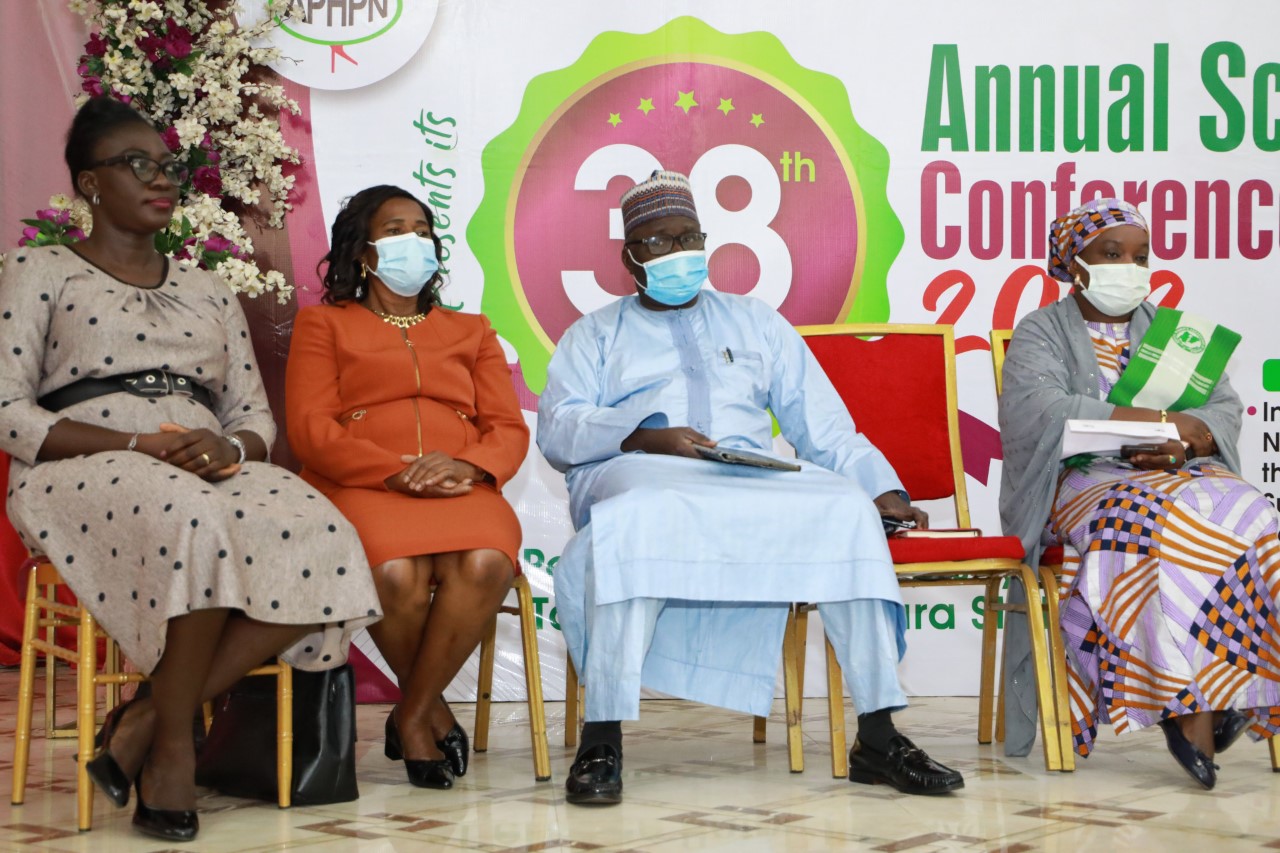Improving access to quality healthcare is dependent on an effective health system that enables the promotion, prevention and reduction of premature and preventable deaths. However, providing access to essential health services, especially family planning (FP), requires sustained financial commitment. The 2018 Nigeria Demographic Health Survey (NDHS) showed a modern contraceptive prevalence rate of 13%. The Nigerian Government aimed to expand access by recommitting to financing family planning to achieve a 27% modern contraceptive prevalence rate (mCPR) among all women by 2024. This commitment was announced during the launch of the Nigeria Family Planning Blueprint for 2020–2024.
Family Planning allocations in Nigeria’s national budgets
A trend analysis of the national budgets from 2017–2022, carried out by the development Research and Projects Centre (dRPC) shows that Nigeria met its N1.2 billion commitment for allocation and full releases for FP in 2018 and 2020, however failed to meet its commitment in 2017, 2019 and 2021, allocating and releasing N917 million, N300 million and N809 million in 2017, 2019 and 2021 respectively. There is no budget line for family planning in the 2022 budget. Family planning funds have been atypically sourced from service-wide votes in the past to make up for deficits. This may be an avenue for financing family planning in 2022, if there is no competing national need, however, this is unsustainable. There is a family planning funding gap in Nigeria, and this has implications on the unmet FP needs of Nigerians.

Family planning funds have been atypically sourced from service-wide votes in the past to make up for deficits. This may be an avenue for financing family planning in 2022, if there is no competing national need, however, this is unsustainable. There is a family planning funding gap in Nigeria, and this has implications on the unmet FP needs of Nigerians.
Private sector collaboration: Key to providing sustainable financing for Family Planning in Nigeria
The private sector has been identified as a critical contributor in the uptake of family planning in Nigeria. The private sector can collaborate with the government to bridge the FP funding gaps and expand access to family planning in Nigeria. Evidence from the 2018 NDHS indicated that over 50% of met needs for contraceptives were sourced from private sector providers. According to the Sustaining Heath Outcomes through the Private Sector (SHOPS) Plus a secondary analysis of the 2018 NDHS on modern contraceptive use revealed that the private sector is critical in driving modern contraceptive uptake through their ability to provide a range of different contraceptive methods.

A 2018 WHO family planning financing evidence brief noted that “greater integration of public and private sectors in service delivery, pooling of procurement, and strategic purchasing will lead to more efficient and higher per capita spending with more consistent investment. Serving women and hard-to-reach populations in low-income countries requires an integrated approach to strengthening health systems in order to move toward universal health coverage”. This goes to show that the private sector can, through social franchise, help expand access to quality family planning commodities and services.
Private and public sector financing for Family Planning
At the 2022 Annual Scientific Conference of the Association of Public Health Physicians of Nigeria (APHPN), in a plenary session themed “The efficiency and effectiveness of private and public sector financing for Family Planning” the tiered accreditation model was explored in detail, with a focus on the potential impact of adopting the public-private partnership model for financing family planning in Nigeria, and its possible role in shaping Nigeria’s ability to meet the FP2030 goal to achieve a future where women and girls everywhere have the freedom and ability to lead healthy lives, make their own informed decisions about using contraception and having children, and participating in society as equals.

According to Pharmacist Emily Olalere, Director of Pharmacy Practice at the Pharmacists Council of Nigeria (PCN), the organisation has a mandate to train and regulate Patent and Proprietary Medicine Vendors (PPMVs) and other pharmacy technicians to provide extended family planning services in hard-to-reach communities. The tiering system was developed in line with the task-shifting, task-sharing (TSTS) policy of the Federal Ministry of Health (FMoH), however, both systems were merged to facilitate the delivery of family planning services and commodities in targeted communities.
In a bid to demystify the need for Community Pharmacists (CP) and PPMVs to provide expanded family planning services in hard-to-reach communities, Pharmacist Bolaji Oladejo, State Programme Manager, IntegratE Project, Society for Family Health explained, “Sexual activities are being practiced everywhere irrespective of location, and we have PPMVs resident in local communities and rural villages. They are patronised by the residents”. Pharmacist Oladejo added that the IntegratE partnership trained over 500 CPs and over 600 PPMVs in Lagos and Kaduna between 2017–2021.
On the role of the government, Pharmacist Ibrahim Ahmed Babashehu, Director of Planning Research and Statistics, PCN, said the federal government has taken up the mandate, through the Pharmacists Council of Nigeria, to provide quality stewardship to guide the affairs of CPs and PPMVs to ensure that their services are in line with government-approved guidelines, and contribute to ensuring that Nigerians have access to better quality health care regardless of where they may be located.
A proven public-private partnership model for financing Family Planning in Nigeria
The IntegratE project provides evidence that CPs and PPMVs have the capacity to provide a wider range of family planning services than currently authorised by law. However, for CPs and PPMVs to be able to provide expanded family planning services, regulations guiding their operations must be enforced to ensure professionalism and quality control and ensure fairness to providers and end users. The Pharmacists Council of Nigeria is working to address those regulatory needs. This is being implemented via the facilitation of a 3-tiered accreditation system.
This tiered accreditation model was piloted in collaboration with PCN, the FMoH and Society for Family Health (SFH), with capacity strengthening and social accountability support from the dRPC PACFaH@Scale programme. From 2017–2021, the IntegratE project designed and successfully implemented the 4-year pilot in Lagos and Kaduna States. The IntegratE Project is an initiative co-funded by Bill and Melinda Gates Foundation (BMGF) and MSD for Mothers. The vision of the project is targeted at increasing service delivery for contraceptive mix and primary health care among Community Pharmacists and Patent and Proprietary Medicine Vendors in Lagos and Kaduna States.
Recommendations for action
The plenary session ended with the following recommendations for action and policy:
To provide expanded family planning services and commodities to rural and hard to reach areas, the potential inherent in the private sector must be harnessed. Based on evidence provided by the IntegratE project, CPs and PPMVs can take on the role as primary providers for family planning services, if they are trained, regulated and gainfully employed, and through this group, the rate of unmet need for family planning services can be reduced.
It is time to migrate data collected by private sector providers into the National Health Management Information System (NHMIS). Once this is achieved, relevant data can be translated into insights that may be used to inform policy and provide evidence for increased sustainability and impact.
The public sector — government at national, state and local level– must collaborate with the private sector to ensure that technical, material and structural resources are pooled to accelerate action in the implementation and sustainability of programmes that provide expanded quality family planning services and commodities to fill the increasing demand in local, rural and hard-to-reach communities. Currently, the federal government, through the Pharmacists Council of Nigeria, is providing guidelines for the operation of private sector providers, however, there is more that should be done in growing investments in family planning by greatly increasing funds allocated to family planning in the national budget.
Beyond family planning, the private and public sector implementing partners of the IntegratE project are on track to scale up activities to provide expanded family planning services and primary health care in more states in Nigeria. The Federal Government must ensure they maintain an enabling environment for private sector providers to efficiently and effectively contribute to increasing reach of and consequently, meet the demand for family planning and other primary health care services.
This is a call to policymakers to finalise and roll out the updated TSTS policy which empowers CPs and health trained PPMVs to carry out more functions than they are currently permitted to. This has the potential to dramatically improve access to primary health care for Nigerians, especially underserved populations, and expand services and supplies through these retail channels in a way that ensures quality and sustainability.


